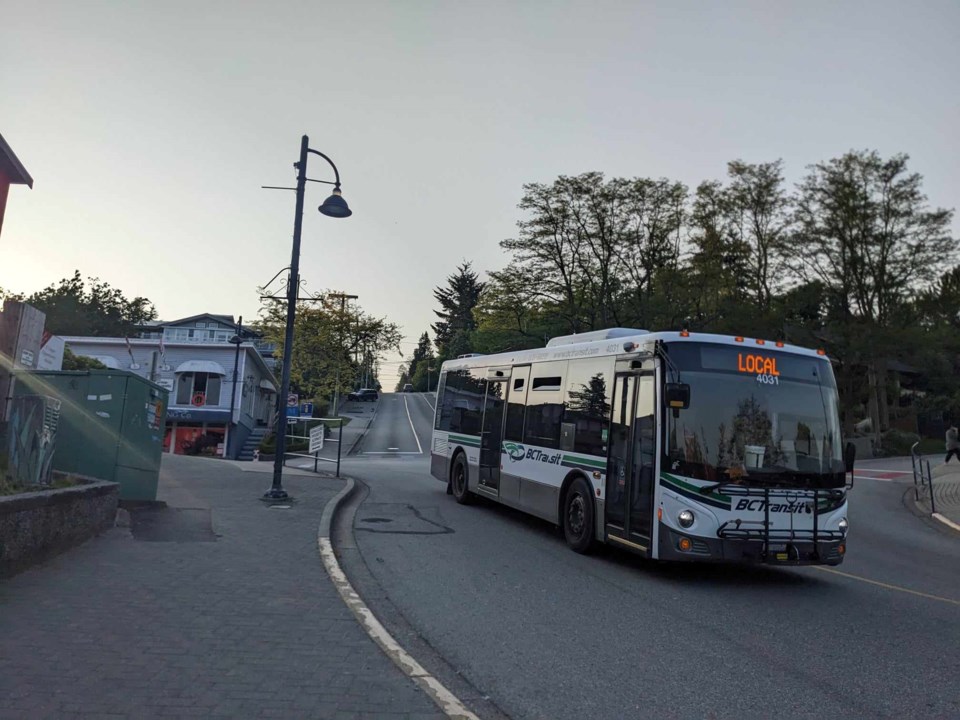Three readings of a bylaw amendment to enshrine free Sunshine Coast Transit fares for those aged under 18 is to be voted on by Sunshine Coast Regional District (SCRD) directors at their Oct. 10 (past Coast Reporter deadline) meeting. With support on those, new fare rules could be adopted at the Oct. 24 board meeting, just in time for the Nov. 1 planned rollout date for the change. (Free fares for those younger than 12 started in all BC Transit service areas in 2021).
Once introduced, the expanded free fares will be able to be accessed using a digital card (on a smart device) or a printed version. These new “S-passes," which are being distributed in cooperation with School District No. 46, will allow the local government to collect ridership data and “minimize fraudulent use” according to a staff report. "The anticipated annual revenue loss related to the fare free transit for youth is $86,500 and has been funded through taxation," said the report.
A 'long journey'
“It's been a long journey to this point, with some hiccoughs along the way, no doubt," Colten Rockford told Coast Reporter. He's the former Gibsons youth councillor who, as part of the Gibsons Transportation and Accessibility Committee, helped launch the 2023 appeal to the SCRD to consider the program.
Rockford, now a student at UBC, said he was fortunate during his years at secondary school on the Coast, as he lived within walking distance of his school and other amenities. But he was still compelled to advocate for free youth fares as a way to improve the local bus system’s viability and to encourage youth to become “life-long transit users."
Speaking from his personal perspective, SCRD Area D director Kelly Backs is a supporter of initiatives that make it easier for local young people to use bus transportation. He relayed to Coast Reporter his experience as a single parent of a secondary school student.
“The school bus leaves [the area near his home] quite early,” said Backs, noting that his son “didn’t really like that and often opted for the transit bus." On days his son missed or chose not to take that bus, Backs noted, “It took more than an hour out of the most productive time in my day to drive him to school and get back."
Even though the younger Backs owned an e-bike, that wasn’t used as frequently as it might have been due to the “poor condition of our road shoulders," according to the director.
While use of transit for school attendance travel meant fewer disruptions to his work day, Backs also acknowledged he raised his son “on a pretty tight budget." In his view, free fares will ease the financial burden “and help level the playing field” when it comes to providing transportation for modest-income Coast families.
The potential to go province-wide
Backs noted that at September’s Union of BC Municipalities (UBCM) convention, a resolution for province-wide free youth transit was originally not placed on the agenda by the executive, but a “small group” of municipal of leaders were able to get the resolution brought forward, and that did receive support. (Gibsons Mayor Silas White and current youth councillor Melyssa Verhoeven presented on the matter at UBCM. Previous youth councillor Cael Read has also been a free youth transit advocate.)
Rockford said, “I was especially excited to see that Free Youth Transit was endorsed at UBCM, as is the result of a continuous work stream from many dedicated community members and leaders on the Coast, and many more throughout the province…With the upcoming provincial election, we have the chance to elect leaders who will prioritize our transit systems, both in Metro Vancouver and the Sunshine Coast, so we'd better take it.”
“For our transit system to appeal to the broader demographics of the Sunshine Coast, the SCRD must continue its good work to increase bus frequency and expand our bus routes," said Rockford. "This work entails coordinating with BC Transit and the provincial government to acquire increased operational funding. The problem is that a lot of these opportunities to improve our transit get stuck in political debates over where to allocate tax funding, and if our provincial politicians don't allocate increased funds, our transit system will remain stuck where it is now.”
“Public transit is a really important part of [the SCRD’s] strategy to try to make the Sunshine Coast a more livable space,” said Backs who noted that his son, a recent secondary school graduate, is now living and using transit in the Lower Mainland.
"Words missing in article? Your adblocker might be preventing hyperlinked text from appearing."

